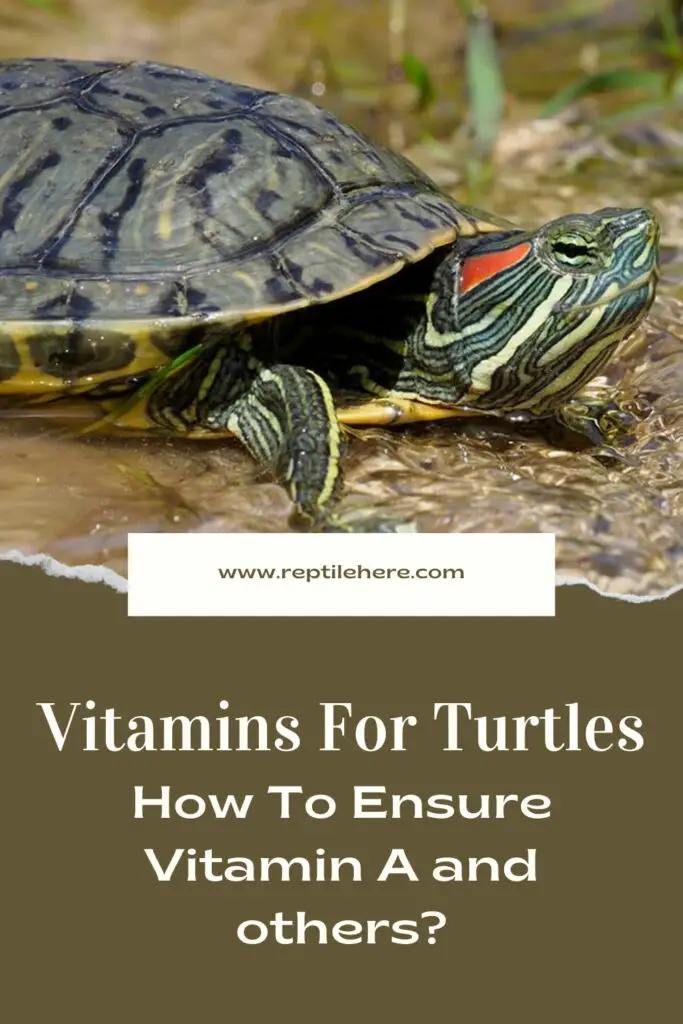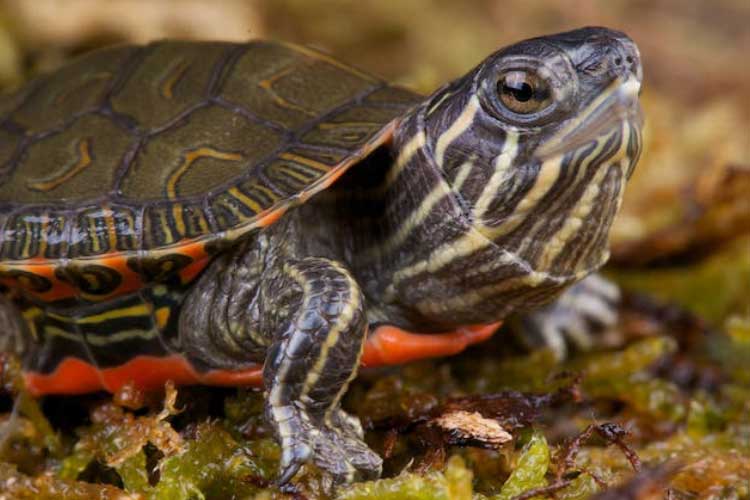Vitamins For Turtles: How To Ensure Vitamin A and others?
A balanced diet that contains all the essential vitamins is vital for the good health of your pet turtle. Vitamin A is one crucial vitamin for your turtle’s health. Its deficiency can lead to a handful of health issues including respiratory infections, digestive issues, mouth rot, aural abscess, and more.
Luckily, you can keep your turtle away from these diseases by feeding him the right diet packed with all the crucial turtle vitamins.
This article contains helpful information on why vitamin A is important for turtles, how to tell if your turtle suffers from vitamin A deficiency, what to feed your pet to ensure they get vitamin A, and so much more.
Vitamin A for turtles: Why do they need it?
Contents
Vitamin A is an oxidant that helps with proper growth and tissue repair in your pet turtle. It plays a major role in the turtle’s health by ensuring proper functioning of the skin, eyes, mucous membrane, and ducts in your turtle organs.
If you don’t feed your pet turtle a balanced diet that contains adequate vitamin A, then it is likely to experience squamous metaplasia. This involves inhibiting typical activities that run in the turtle organs and skin by simply getting in the way of fluid flow through ducts within the turtle organs.
Lack of vitamin A, also known as hypovitaminosis A, is more likely to appear in young turtles (both semi-aquatic and box species) over 6 months old.
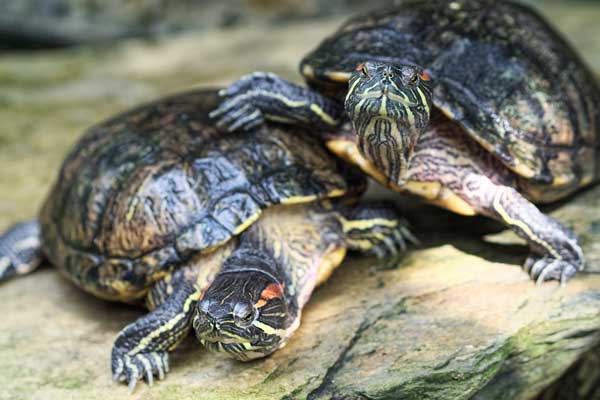
It’s quite rare for tortoises to experience vitamin A deficiency as their diet is always high in veggies that carry this vitamin.
The condition is also less likely to occur in turtles under 6 months given that their yolks usually contain sufficient amounts of vitamin A to nourish them for a few months.
But as this vitamin source runs low, you must feed your turtle with a balanced diet to ensure they don’t get a vitamin A deficiency.
How do you tell if your turtle has a vitamin A deficiency?
The best way to tell if your turtle has vitamin A deficiency is by looking for the key symptoms of this condition.
These symptoms include:
- Swollen eyelids
- Loss of appetite
- Weight loss
- Raw skin with bacterial infections
- Mouth rot/infection
- Nasal discharge
- Respiratory infections
- Severe cases of this condition can also affect the liver, kidneys, and pancreas.
Note that swollen eyelids are the most tell-tale sign of Hypovitaminosis A in turtle. The swelling can get so severe that the eyes can’t open.
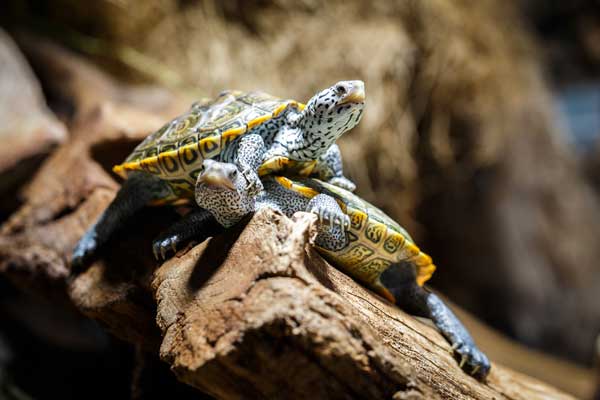
However, it is also a sign of bacterial infection in the turtle’s respiratory tract or eye. Thus, your vet will carefully diagnose your turtle to determine what’s causing the eye issue before recommending any treatments.
Vitamin A deficiency also leads to other health issues in turtles including stomatitis, otitis, and pneumonia. These will only clear up if the vitamin A deficiency problem is resolved.
What can I feed my turtle that has vitamin A deficiency?
Poor diet is the primary reason your turtle lacks vitamin A. As such, you want to adjust what you’ve been feeding your turtle and start giving him foods that are high in vitamin A.
That said, foods that are rich in Vitamin A include leafy green vegetables—especially dandelion greens. Vegetables that are yellow and orange also contain high Vitamin A quantities and include yellow squash and carrots.
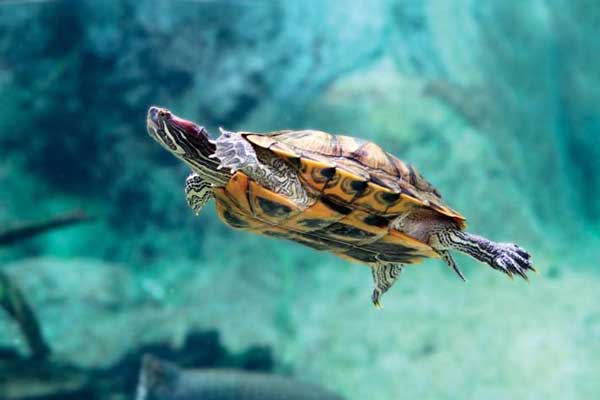
Feeding your turtle whole fish and liver will also ensure they get vitamin A.
Here’s our list of turtle food with vitamin A:
- Cantaloupe
- Apricots
- Broccoli leaves and/or flowerets
- Collard greens
- Kale
- Spinach
- Mangoes
- Mustard green
- Papaya
- Nectarines
- Turnip greens
- Sweet potatoes
- Peaches
- Parsley
You should also take note of foods that contain low levels of vitamin-A. These include an all-meat diet, iceberg lettuce, or even poor-quality commercial pellets.
If you feed your turtle these types of food, you’re exposing them to vitamin-A deficiency.
Other foods that contain near-zero vitamin-A levels include grapes, apples, bananas, corn, oranges, summer squash, and white potatoes.
What if your pet turtle is a picky eater and won’t eat most of these foods? In this case, get a turtle vitamin A supplement from your local pet shop.
The supplement usually comes in liquid form, and you just need to add a few Vitamin A drops for the turtle to its favorite food as directed.
What to do if my turtle has vitamin A deficiency?
If you notice your turtle has vitamin A deficiency and the symptoms we discussed above are showing, then you should bring him to your vet.
The vet will perform a physical examination which includes oral and eye examination.
Your vet may also ask you about your pet’s history, including his diet, supplements you feed him, etc. He may also ask you about the symptoms he’s showing.
Since vitamin A deficiency symptoms are pretty similar to those of other diseases, the vet will take his time to rule out other reasons for these symptoms.
Since turtles suffering from vitamin A deficiency also tend to have bacterial infections as a secondary health issue, your vet may take blood tests to see if your little friend has any underlying infections.
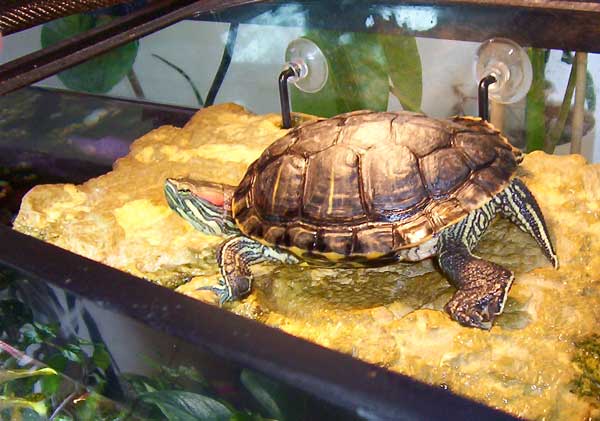
Sometimes the veterinarian can also perform a biopsy of your turtle’s abnormal skin to understand if the abnormalities are caused by excessive keratin resulting from lack of vitamin A.
If your vet finds your turtle to be suffering from lack of vitamin A after the above diagnosis process, one important part of the recommended treatment is feeding him food that contains enough vitamin A. The vet may also recommend a supplement to help with the issue.
And if your turtle has any underlying fungal or bacterial infection, your vet will also administer topical and/or systematic anti-fungal or antibiotic medications.
What happens if a turtle gets too much vitamin A?
If you give your turtle too much vitamin A foods or Vitamin A supplements for turtles than required, then they may develop a condition known as hypervitaminosis A, which is essentially a vitamin A overdose.
Hypervitaminosis A may result in many negative effects on your turtle’s health
It can also make it hard to discern between hypervitaminosis A and hypervitaminosis A, making things even more complicated.
Some of the common symptoms of these two conditions include puffy eyes, skin shedding, constant nasal discharge, and ulcers.
Unfortunately, overdoing your turtle with vitamin A isn’t reversible, so the treatment would be more supportive and will include preventing secondary skin infections.
Decreasing or disconnecting the vitamin A consumption in your turtle may also help.
Note that overdosing is more likely to happen if you give your pet supplements for the same. It’s quite rare for vitamin A from natural sources to cause an overdose!
How do turtles get vitamins?
Turtles get most of their vitamins through a proper diet. Vitamin A is one of the most crucial vitamins for turtles.
And they can get it through proper nutrition that contains foods rich in this vitamin, including leafy greens and others as we listed earlier in this post.
For vitamin D3, turtles must be exposed to sunlight or a source of UV lighting to enable the pigmented cells in the turtle skin and carapace to synthesize it.
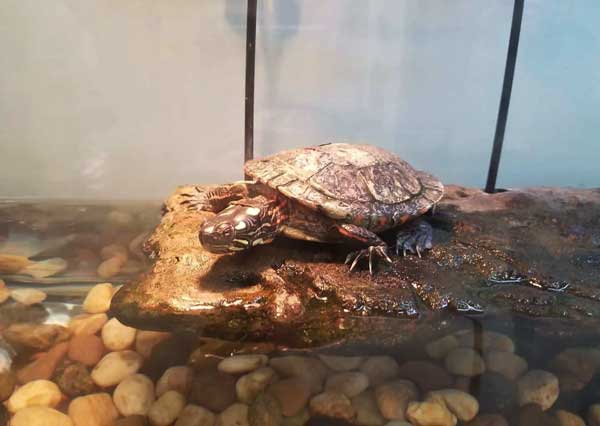
Other essential vitamins for your pet turtle include vitamins B1, C, K, and E which the turtles get through a proper diet.
For instance, turtles get B1 by feeding feeder fishes and bass fishes.
Vitamins C and K are available in leafy greens, and vitamin E occurs in leafy greens as well as apple peels, sweet potatoes, and blueberries.
Do turtles need vitamin D?
Absolutely! Vitamin D3 is the second most important vitamin for your pet turtle. Your turtle skin and shell feature pigment cells that help synthesized vitamin D3 when your turtle basks in the sunlight or under a UVB lamp.
As one of the crucial vitamins for turtles, vitamin D3 ensures proper absorption of calcium in the turtle’s body. Calcium is key for maintaining strong and healthy tissues, skin, skeletons, and carapace in the turtle
Lack of this essential nutrient can lead to metabolic bone disease (MBD).
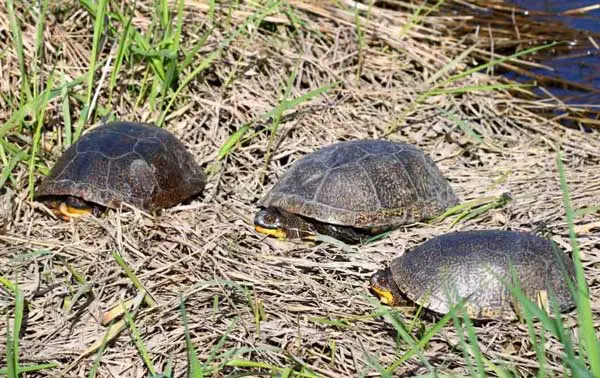
You want to ensure your turtle has access to a basking spot well equipped with decent UVB lighting to ensure maximum UV light absorption for vitamin D synthesis.
Or if possible, make sure they have exposure to natural sunlight which remains the best source of UV lighting.
We recommend you allow your turtle a basking period of around 30 to 40 minutes 2-3 times every week to minimize the chances of vitamin D3 deficiency.
Unlike in the case of vitamin A, it isn’t always necessary to give your turtle vitamin D3 supplements as exposure to UVB light or natural sunlight is quite enough for them.
The only time you may consider the supplements is when the conditions aren’t right for your turtle to bask and you’re worried about their vitamin D3 levels.
For instance, when it’s cold for your turtles to bask, you may consider giving them a vitamin D3 supplement tablet every once in a while.
FAQs:
If your turtle has vitamin A deficiency, you should take him to your vet for diagnosis to confirm if he’s indeed suffering from this condition. This is because hypervitaminosis A symptoms are similar to other illnesses. After diagnosis, your vet will recommend the best treatment. You’d also want to start feeding your turtle a proper diet with foods rich in vitamin A.
Just exposing your turtle to natural sunlight or a UV light radiating bulb is all you need to ensure your turtle receives vitamin D3. However, if your turtle can’t access the sunlight or UVB source of light, you can give them vitamin D3 pills once in a while to replenish their vitamin D3 levels.
Final Verdict
The two most important turtle vitamins include Vitamin A and D3. As long as you give your pet turtle a well-balanced diet, it’ll be safe from vitamin A deficiency and its consequences. And as long as your pet gets proper exposure to natural sunlight or UVB lighting, you don’t have to worry about vitamin 3 deficiency.
Our guide above has provided you all the information you need to know about vitamin A deficiency including key symptoms, foods to feed your turtle, foods to avoid, and treatment options. We hope this guide will help you keep your turtles healthy and free from vital vitamin deficiencies.
